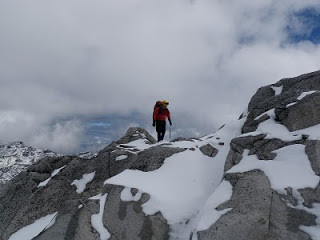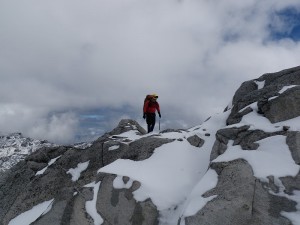The most dangerous pursuit

Premise: the most hazardous backcountry activity in BC is to do so while being a tourist or an exchange student.
We do a lot of rescues in BC, about 1300 a year now.
There are a lot of ways to get killed in the backcountry, but one of the easiest to prevent is possibly getting lost, and nobody reporting you missing.
The single most dangerous thing you can do is to go for a hike and tell nobody where you’re going.
As I’ve written here before, and as one runner recently recounted, your smart phone is not going to do you much good. If you go for a hike by yourself, chances are you’re not going to be able to call for help. Cell phone contact in BC is so bad that we can’t even get service in the parking lot of one of the most popular parks in BC. A few hundred metres is all it takes to be out of contact, and if anything happens to you there, you’re done.
It gets worse. If you drive, you have a small chance of someone noticing your car in the parking lot. If it is found, the police will eventually get called, the plate will be run, and an owner or address will come up. The police will investigate; they’ll call or visit the address and see if someone there can figure out why the car is in the lot. This will take about an hour, perhaps longer.
It gets even worse. If you take transit, or ride your bike, nobody will call for help. It could be a week, perhaps two.
It happens, several times a year. Mostly to tourists or exchange students. The most recent example was the high profile search for Liang Jin. Several days can go by before any real search is initiated, and by then it is too late.
These searches almost always end without the subject being found. The main reason? The SAR teams have NO IDEA where to start searching. Without a last known position, the chances of finding the person are almost zero. The very thing we love, the BC backcountry, works against us. The very best we can hope for is to see animal activity near a body. In the worst case, nothing is ever found.
Several years back, the very high profile search for Tom Billings brought some calls for the installation of cameras at trail heads on the North Shore. An interesting idea, but ultimately one that would not save lives. In the first place, if someone doesn’t tell anyone where they are going, it’s going to take days for the person to be reported missing. Second, we already have cameras on transit throughout the Lower Mainland, and we know that it takes days or even weeks to access and watch the video from those cameras. The timelines just don’t add up to a survivable time frame. There are other issues; installing the cameras at a few trail heads seems reasonable, but for each new camera there could be hundreds or thousands of hours of video to watch, not to mention thousands of dollars in capital and ongoing costs for a reliable system. Faced with these realities, the idea was, of course, not implemented.
In my previous post I recounted my first live long line rescue where we recovered the body of a hiker who had the equipment but possibly was lacking the training or knowledge how to use it. My point in this post is that there are things you do before you leave that make a difference.
Actions?
What can we do about this?
I’v heard one suggestion that local hiking groups have a role, but I don’t think that’s where the issue is.
The big issue here is visitors to BC who think possibly that the backcountry here is rather safe. Tourism BC, ski hills, resorts, everyone relentlessly promote the BC backcountry for financial gain, but spend very little on informative and cautionary tales on how to survive. I believe that government and private industry that benefit from the BC backcountry must consequently also fund preventative messaging in multiple languages.
As an example, AdventureSmart recently took down trip plans in other languages (Punjabi, Chinese, etc) in order to focus on French and English. I believe this is detrimental to public safety, especially in BC where we promote our backcountry to those who are least likely to understand the hazard, or be able to plan for it. This, at the very least, should change as soon as possible.


Leave a Reply